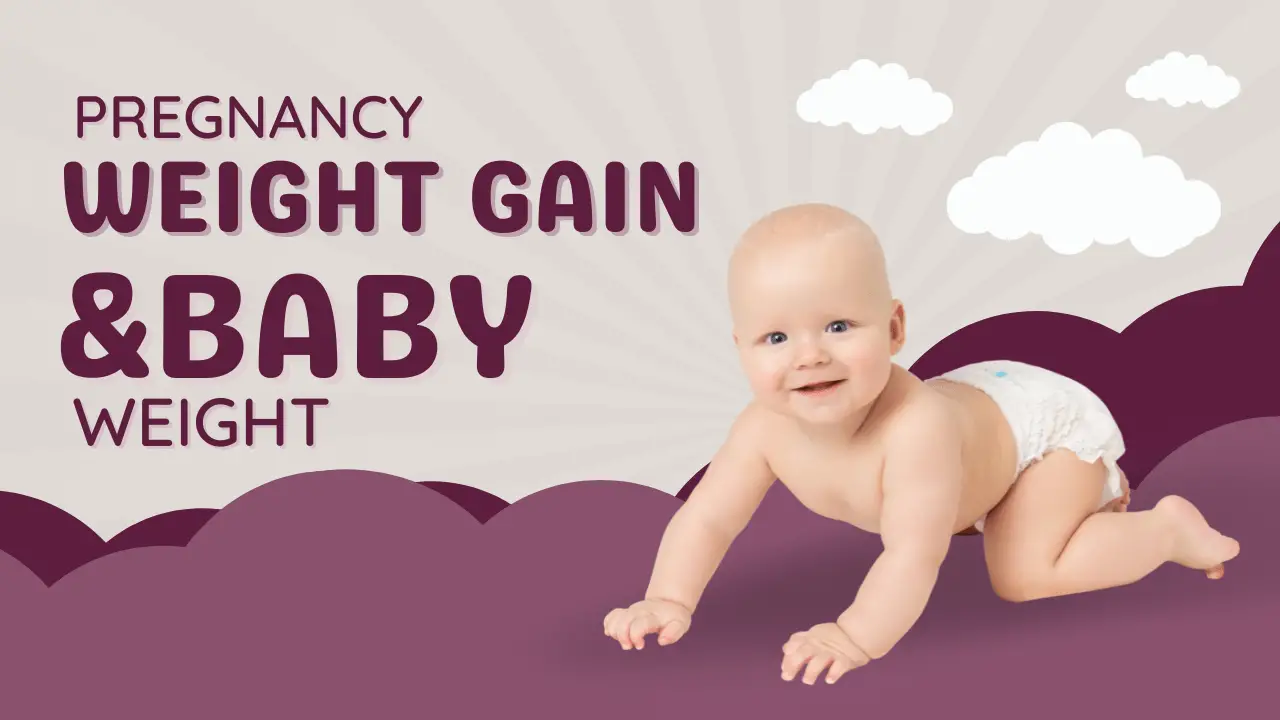There is no shortage of advice to navigate the pregnancy path, much of it laced with misconceptions and fallacies. A commonly misinterpreted topic is the connection between weight growth during pregnancy and the weight of the newborn.
Conflicting information is often given to expectant moms, which can cause misunderstanding and unneeded stress. While some worry that gaining too much weight could cause issues, others think that gaining more weight will guarantee a larger, healthier kid. But the reality is more complicated.
It’s critical to know pregnancy weight gain and baby weight in order to make decisions that promote the health of both the mother and the fetus. This blog article attempts to dispel popular misconceptions and offer evidence-based advice to support you in keeping a healthy balance.
By focusing on what really matters, you can approach your pregnancy with confidence, knowing that your weight gain is contributing positively to your baby’s development.
Myth 1: More Weight Gain Equals a Bigger, Healthier Baby:
One of the most common myths surrounding pregnancy is the belief that more weight gain by the mother will result in a bigger, healthier baby. This misconception can lead expectant mothers to overeat or gain excessive weight, thinking it will benefit their baby.
This myth, however, is untrue and may put the mother and the child in danger. While weight growth is a common and expected part of pregnancy, it’s important to understand that depending on the mother’s body mass index (BMI) before getting pregnant, there is a range within which weight increase is deemed safe.

Gaining too much weight might raise the risk of issues like high blood pressure, gestational diabetes, and the necessity for an emergency cesarean section. It may also result in a larger birth weight, which raises the possibility of difficulties during delivery.
Furthermore, genetics, mother health, and lifestyle all have an impact on the association between pregnancy weight growth and baby weight. Increasing weight alone does not ensure a healthier child. The mother’s diet, consistent prenatal care, and adherence to safe weight gain norms are what really count.
Focusing on balanced nutrition and moderate weight gain is key to ensuring the well-being of both mother and baby, rather than subscribing to the myth that more weight always equals a bigger, healthier baby.
Myth 2: You Must Eat for Two:
The idea that pregnant women must “eat for two” is a widespread myth that often leads to overeating and excessive weight gain. This notion suggests that a pregnant woman needs to double her food intake to nourish both herself and her baby, but this is far from the truth.
In reality, the caloric needs during pregnancy increase only modestly, particularly in the second and third trimesters. During the first trimester, most women don’t need any additional calories beyond their regular intake.

As pregnancy progresses, an extra 300 to 500 calories per day is usually sufficient to support the growing baby. This is far from doubling one’s food intake. The focus should be on the quality, not the quantity, of food consumed.
The “eat for two” myth can lead to overeating during pregnancy and after delivery, which can increase the risk of issues like gestational diabetes, high blood pressure, and larger-than-average babies. These issues may make childbirth challenging and necessitate procedures like cesarean sections.
Pregnant women should prioritize eating a balanced, nutrient-rich diet over dining for two. This strategy guarantees that mom and baby get the nutrients they need without running the danger of overeating, supporting both healthy weight growth and ideal fetal development.
Myth 3: Every Pregnant Woman Gains the Same Amount of Weight:
A common misconception is that all pregnant women should gain the same amount of weight. This myth overlooks the fact that pregnancy weight gain and baby weight vary greatly depending on individual factors such as a woman’s pre-pregnancy body mass index (BMI), metabolism, and overall health.
Suggested weight gain amounts are individualized. Pregnant women with lower prenatal BMIs may need to gain more weight, whilst those with higher prenatal BMIs may need to gain less.
This tailored approach supports the health of both the expectant woman and the developing child throughout the pregnancy. The idea that all expecting mothers should gain the same amount of weight can lead to dangerous actions or unnecessary anxiety.
To achieve the best outcomes for weight increase during pregnancy and postpartum, it is imperative to follow the advice provided by medical professionals, which considers unique health situations.
Myth 4: Pregnancy Weight Gain Determines Baby’s Birth Weight:
The belief that pregnancy weight gain directly determines a baby’s birth weight is a widespread myth that oversimplifies the complex factors involved in fetal development. While it’s true that a mother’s weight gain can influence her baby’s size, it is not the sole determinant of the baby’s birth weight.
Factors such as genetics, maternal health, and placental function play significant roles in determining the baby’s size. For instance, due to variations in their genetic composition or medical problems like gestational diabetes, two women who gained identical amounts of weight throughout pregnancy may give birth to children with differing birth weights.
On the other hand, putting on too much weight does not ensure a bigger baby and may possibly cause issues during delivery or premature birth.
Understanding that pregnancy weight gain and baby weight are influenced by multiple factors helps mothers focus on maintaining a healthy lifestyle rather than fixating on weight gain alone.
The Facts About Pregnancy Weight Gain and Baby Weight:
A healthy pregnancy depends on knowing the facts of pregnancy weight growth and infant weight. Contrary to common misconceptions, a mother’s weight increase during pregnancy does not impact the birth weight of her unborn child.
Instead, pregnancy weight gain and baby weight are influenced by a number of variables, such as genetics, mother nutrition, and general health. Healthy weight gain during pregnancy is vital for supporting the baby’s growth and development, as well as the mother’s health.
The recommended weight gain varies based on a woman’s pre-pregnancy body mass index (BMI), with guidelines suggesting a range tailored to individual needs. Proper nutrition plays a key role in achieving these targets, focusing on nutrient-dense foods that provide essential vitamins and minerals without excessive calories.
By following these evidence-based guidelines, mothers can promote a healthy pregnancy, ensuring that both pregnancy weight gain and baby weight are within a safe and healthy range.
How to Manage Pregnancy Weight Gain Effectively:
Effectively controlling weight gain during pregnancy is crucial for the mother’s and the unborn child’s health. Achieving a balance between gaining enough weight to support the baby’s development and avoiding overeating, which may result in difficulties, is crucial.
Pregnancy weight gain and baby weight management are mostly dependent on eating a good, balanced diet and doing regular exercise. Lean proteins, whole grains, fruits, and veggies supply you with the essential vitamins and minerals without packing on the pounds.
Overeating can be avoided by practicing portion control and attentive eating, as well as by drinking plenty of water and avoiding foods high in empty calories.

In addition to diet, regular, moderate exercise—such as walking, swimming, or prenatal yoga—supports healthy weight gain and overall well-being.
Consulting with healthcare providers to monitor weight gain and adjust dietary and exercise habits as needed ensures that both pregnancy weight gain and baby weight stay within a healthy range, promoting a positive outcome for both mother and baby.
Conclusion:
Understanding the relationship between pregnancy weight gain and baby weight is essential for a healthy pregnancy. By debunking common myths and focusing on evidence-based facts, expectant mothers can manage their weight gain effectively, ensuring both their well-being and their baby’s development.
Emphasizing balanced nutrition and regular exercise, while following personalized guidelines, supports optimal outcomes. Remember, the goal is not just to gain weight, but to gain it wisely to benefit both pregnancy weight gain and baby weight. Click to learn more.
FAQs:
- What is the recommended amount of weight gain during pregnancy?
Answer: The recommended weight gain varies based on pre-pregnancy BMI. Generally, it’s about 25-35 pounds for those with a normal BMI. - Can excessive weight gain harm my baby?
Answer: Yes, excessive weight gain can increase the risk of complications such as gestational diabetes and preeclampsia, which may affect your baby’s health. - How can I manage pregnancy weight gain effectively?
Answer: Maintain a balanced diet, exercise regularly, and monitor your weight gain with your healthcare provider to stay within recommended guidelines. - Does eating for two means doubling my calorie intake?
Answer: No, you only need an extra 300-500 calories per day during the second and third trimesters, not double your usual intake. Focus on nutrient-dense foods. - Does my weight gain during pregnancy directly determine my baby’s birth weight?
Answer: Not directly. While weight gain influences baby weight, factors like genetics and overall health also play significant roles.

1 thought on “Pregnancy Weight Gain and Baby Weight: Myths vs. Facts”